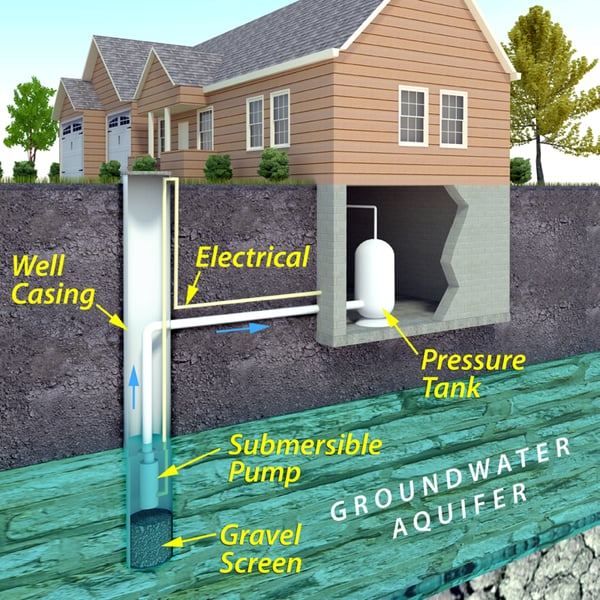We talk a lot about water softening treatments to help combat hard water (water that is high in dissolved minerals like calcium and magnesium). Hard water, however, is harmless to human health. It merely causes headaches when it comes to wear and tear on home appliances and industrial machinery, and some people don’t like the taste.
Well water, on the other hand, is an entirely different animal. Softening treatments may be needed if your well water is hard, but even more important may need purification and sanitization treatments to ensure your well water is safe to drink.
What’s in My Well Water?Private well water is unregulated by state and federal agencies in most instances. Well owners are responsible for their own safety when drinking from a private water source. Since water contaminants can be colorless and odorless, you can’t determine if well water is safe to drink just by look or taste.
There are a wide variety of contaminants that can be present in well water, from bacteria and nitrates (typically found in fecal matter from humans and animals) to lead and heavy metals that are stripped from plumbing fixtures. Household wastes, industrial and hazardous wastes, pesticides and fertilizers are all potentially dangerous contaminants that can seep into the ground and impact well water safety. For more information on potential well water contaminants and their health impacts, check out this article from the United States Environmental Protection Agency.

Get Your Well Water Tested!
Private well water needs to be checked, at a minimum, every year for cleanliness. Why so frequently? The quality of your water can change, even suddenly, without you ever noticing a change in look, smell, or taste. Our environment is continuously impacted by the activities of other residents and businesses around us, and it is remarkably easy for contaminants to seep into the groundwater supply.
The American Academy of Pediatrics and researchers at the National Institute of Environmental Health Sciences, part of the National Institutes of Health, strongly recommend annual water testing for private wells, particularly if there are children in the house, as chemical contaminants can pose an increased risk to your health. Nitrates, for example, one of the most common well water contaminants, can be a problem for infants under three months who are unable to metabolize nitrates.
You also should have your well water retested if there are known problems with other well water sources in your area, if you have experienced flooding or extreme drought in your area, or if there have been any land disturbances near your well. Retesting should also occur if you replace or repair any part of your well system or if you notice a change in your water quality.
It is essential to have your well water tested by a certified drinking water laboratory in your state. You can find a list of certified laboratories in the state of Indiana here.
Treating Well Water Contaminants
If test results are positive for contaminants in your well water, there will be options to treat it, depending on the types of contaminants present. You may be able to treat water with a softener or oxidation filtration system, and in some cases, chlorination treatments may also be an option.
Talk to your Indy Water Pro if you need more information on evaluating or treating your well water system. No two well water supplies contain the same contaminants, so it’s essential to create an individualized treatment plan based on your water testing results.





